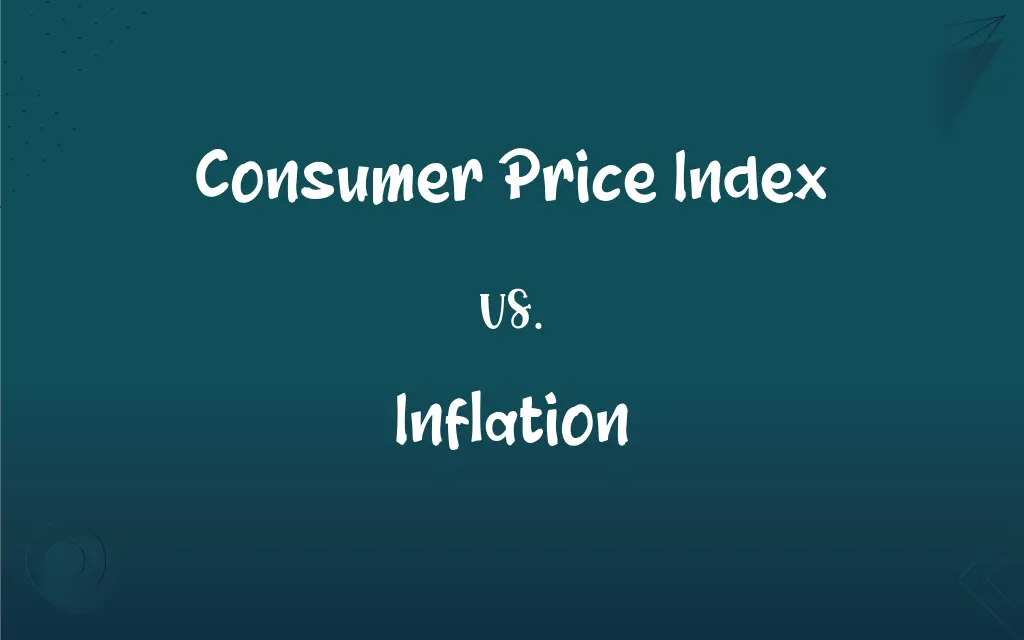Consumer Price Index vs. Inflation: What's the Difference?
Edited by Harlon Moss || By Janet White || Published on December 23, 2023
The Consumer Price Index (CPI) measures the average change over time in the prices paid by consumers for a market basket of goods and services, while inflation is the rate at which the general level of prices for goods.

Key Differences
The Consumer Price Index (CPI) is a statistical tool to measure price changes in a selected basket of goods and services over time, while inflation is an economic concept referring to the overall increase in price levels in an economy.
CPI calculates the price change of a constant set of goods and services, while inflation reflects the rate at which the overall price level increases.
CPI is used as an indicator to adjust salaries, pensions, and tax brackets, while inflation indicates the loss of purchasing power in an economy.
CPI is calculated using data on spending patterns and prices, whereas inflation rate is derived from CPI and other price indices.
Policymakers use CPI to make economic decisions, while inflation rate influences monetary policy, interest rates, and economic planning.
ADVERTISEMENT
Comparison Chart
Definition
Measures average price changes of a selected good basket.
Rate of increase in overall price levels.
Primary Function
Tracks cost of living and purchasing power changes.
Indicates economic health and purchasing power loss.
Calculation Basis
Based on a fixed basket of goods and services.
Calculated from CPI and other price data.
Usage in Policy
Used for wage, pension, and policy adjustments.
Guides monetary policy and economic strategy.
Economic Indication
Specific to consumer goods and services.
Reflects general price level movement in the economy.
ADVERTISEMENT
Consumer Price Index and Inflation Definitions
Consumer Price Index
Consumer Price Index (CPI) is a measure that examines the weighted average of prices of a basket of consumer goods and services.
The Consumer Price Index rose by 2% last quarter, indicating increased cost of living.
Inflation
Inflation indicates a decrease in the purchasing power of a nation's currency.
Due to inflation, the value of money decreased, making everyday items more expensive.
Consumer Price Index
The Consumer Price Index helps in adjusting income and expense figures over time.
Salaries were indexed to the Consumer Price Index to maintain purchasing power.
Inflation
Inflation is measured by the rate of increase of a price index, typically the Consumer Price Index.
The central bank monitors inflation through changes in the Consumer Price Index.
Consumer Price Index
CPI is an economic indicator of inflation in the consumer sector of an economy.
Analysts use the Consumer Price Index to gauge inflation trends.
Inflation
Inflation is the rate at which the general level of prices for goods and services is rising.
Inflation reached 3% this year, affecting the buying power of the currency.
Consumer Price Index
CPI is a tool for comparing how much consumers are paying for goods and services over time.
Comparing this year's Consumer Price Index to last year's shows the change in consumer costs.
Inflation
Inflation affects economies by reducing the real value of money over time.
Inflation eroded the savings value, making it less valuable than it was a year ago.
Consumer Price Index
CPI is used to assess price changes associated with the cost of living.
The government adjusted social security payments based on the Consumer Price Index increase.
Inflation
Inflation is an essential factor in adjusting interest rates and monetary policy.
To combat high inflation, the central bank raised interest rates.
Inflation
The act of inflating or the state of being inflated.
Inflation
A persistent increase in the level of consumer prices or a persistent decline in the purchasing power of money.
FAQs
What does the Consumer Price Index measure?
CPI measures the average change in prices over time for a basket of goods and services.
What causes inflation to rise?
Inflation rises due to factors like increased demand, higher production costs, and monetary policies.
Is CPI used globally?
Yes, CPI is used globally as a standard measure of inflation and cost of living.
Can inflation be negative?
Yes, negative inflation, or deflation, occurs when price levels decrease.
How is inflation different from CPI?
Inflation is the overall increase in price levels, while CPI is one measure used to estimate inflation.
Can CPI predict inflation trends?
Yes, CPI is a key indicator used to predict inflation trends in an economy.
Does CPI include all goods and services?
CPI includes a representative sample of goods and services, but not all.
Are CPI and inflation the same in all countries?
While the concepts are similar, the specific goods in CPI and inflation rates vary by country.
Does CPI affect personal finance?
Yes, CPI affects personal finance by indicating changes in the cost of living.
Can CPI adjustments affect pensions?
Yes, pensions and social benefits are often adjusted based on CPI changes.
How often is CPI updated?
CPI is typically updated monthly or quarterly by statistical agencies.
What is core inflation?
Core inflation excludes volatile items like food and energy from the CPI calculation.
Are there different types of CPI?
Yes, there are different types of CPI, like CPI for Urban Consumers (CPI-U) in the US.
What role does the central bank play in controlling inflation?
Central banks control inflation through monetary policy, like adjusting interest rates.
How does CPI influence business decisions?
Businesses use CPI to adjust prices, wages, and budgets to keep pace with the cost of living.
Does a high CPI always mean high inflation?
A high CPI can indicate high inflation, but they are not always directly proportional.
What is hyperinflation?
Hyperinflation is an extremely high and typically accelerating inflation rate.
How do governments respond to high inflation?
Governments may respond with fiscal and monetary measures like interest rate adjustments.
Can a stable CPI benefit an economy?
Yes, a stable CPI can indicate a stable economy and help in long-term economic planning.
What impact does inflation have on savings?
Inflation decreases the purchasing power of savings over time.
About Author
Written by
Janet WhiteJanet White has been an esteemed writer and blogger for Difference Wiki. Holding a Master's degree in Science and Medical Journalism from the prestigious Boston University, she has consistently demonstrated her expertise and passion for her field. When she's not immersed in her work, Janet relishes her time exercising, delving into a good book, and cherishing moments with friends and family.
Edited by
Harlon MossHarlon is a seasoned quality moderator and accomplished content writer for Difference Wiki. An alumnus of the prestigious University of California, he earned his degree in Computer Science. Leveraging his academic background, Harlon brings a meticulous and informed perspective to his work, ensuring content accuracy and excellence.































































